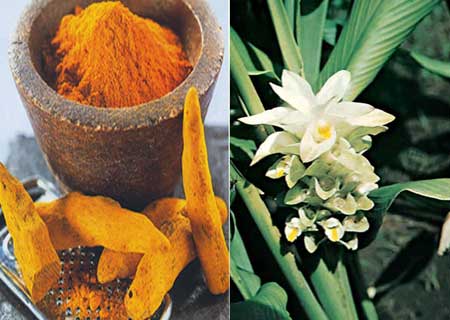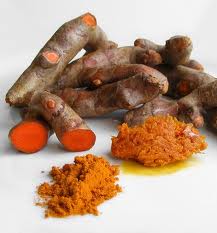Turmeric (Curcuma longa) is a herbaceous perennial plant of the ginger family, Zingiberaceae. It is native to tropical South Asia and needs temperatures between 20°C and 30°C, and a considerable amount of rainfall to survive.
Plants are gathered annually for their rhizomes. The rhizomes are boiled for several hours and then dried in hot ovens, after which they are ground into a deep orange-yellow powder commonly used in spices and curries, for dyeing, and to impart colour to mustard condiments and butter. Its active ingredient is curcumin, which has an earthy, bitter, peppery flavour and a mustardy smell.

Turmeric has been used for at least 4000 years in Traditional Chinese and Ayurvedic medicine to treat a variety of ailments.
There are frequent media reports claiming medicinal properties of turmeric, some of which are supported by quality scientific data and some of which are not.
It is important to bear in mind that many studies have been done in test tubes and animals, and the herb may work differently or not as well in humans.
Furthermore, some studies have used an injectable form of curcumin, and the results may not relate well to the effects of oral ingestion of turmeric itself.
In spite of these caveats, there is promising evidence that turmeric may be helpful for fighting infections and some cancers, reducing inflammation, and treating digestive problems.
The curcumin in turmeric has been shown to stimulate the production of bile by the gallbladder.
Curcumin is also a powerful antioxidant. Antioxidants protect the body from the adverse effects of very reactive molecules called free radicals, which damage cell membranes and DNA, and may even cause cell death.
In addition, curcumin reduces inflammation by lowering levels of two inflammatory enzymes (called COX-2 and LOX) in the body and stops platelets from clumping together to form blood clots. COX-2 is the target enzyme of the non-steroidal anti-inflammatory drugs, so curcumin works in a similar way to these drugs, without the side-effects.
Indigestion
At least one double-blind placebo-controlled study has shown that turmeric was effective for treating people with indigestion, reducing symptoms of bloating and gas. In Germany, turmeric has been approved for use in treating digestive disorders.
Ulcerative colitis
In one double-blind placebo-controlled study, people whose ulcerative colitis was in remission either received curcumin or placebo, along with conventional medical treatment for 6 months. Those who took curcumin had a relapse rate that was much lower than those who took the placebo.
Stomach ulcers
Turmeric does not appear to be helpful in treating stomach ulcers, and there is some evidence that it may increase the amount of acid in the stomach, making existing ulcers worse.
Osteoarthritis
Turmeric may be useful for relieving symptoms of osteoarthritis due to its ability to reduce inflammation. A study of people using an Ayurvedic formula of herbs and minerals containing turmeric as well as Withinia somnifera (winter cherry), Boswellia serrata and zinc significantly reduced pain and disability. Due to the study design, it is not possible to know if this effect is from turmeric alone, or the combination of herbs working together.
Atherosclerosis
In animal studies, an extract of turmeric lowered cholesterol levels and kept LDL or ‘bad’ cholesterol from building up in blood vessels, a process that can result in blocked arteries leading to heart attack or stroke. Turmeric also stops platelets from clumping together, so may help to prevent build-up of blood clots along the artery walls. These findings need to be confirmed in clinical trials.
Cancer
There is substantial interest in turmeric’s potential anti-cancer properties. Evidence from test tube and animal studies suggests that curcumin may help prevent, control or kill several types of cancer cells, including prostate, breast, skin and colon. Curcumin’s effects may be due to its ability to stop the blood vessels that supply cancerous tumours from growing, and from its effects as an antioxidant, protecting cells from damage. More research is needed in order to understand if turmeric is effective in preventing or treating cancer in humans.
Diabetes
When laboratory animals with diabetes were given turmeric, their blood sugar levels dropped, as did their cholesterol levels. Researchers do not yet know if such effects will occur in human subjects with diabetes.
Bacterial and viral infections
Anti-microbial properties of turmeric have been observed in laboratory studies but there is little data available on similar effects in humans.
Uveitis
In one study of 32 people with uveitis, inflammation of the eye, curcumin appeared to be as effective as corticosteroids.
If a teaspoon of turmeric is added to the cooking water of brown rice, the rice becomes a bright yellow colour. This yellow-coloured rice can then be used in dishes such as paella, kedgeree and rice salad, together with multi-coloured vegetables, such as red pepper, sauteed courgettes, diced carrots, peas and sweetcorn. Children love the bright colours and this is a good way to tempt them to eat more nourishing whole grains and vegetables.
For recipe ideas, tips and information about following a plant-based diet please sign up for my free newsletter and check out my website.
You can also find me on Facebook, Twitter and LinkedIn.
Jane Philpott
References
Ammon HPT, Wahl MA. Pharmacology of Curcuma longa. Planta Medica. 1991;57:1-7.
Arbiser JL, Klauber N, Rohan R, et al. Curcumin is an in vivo inhibitor of angiogenesis. Mol Med. 1998;4(6):376-383.
Asai A, Miyazawa T. Dietary curcuminoids prevent high-fat diet-induced lipid accumulation in rat liver and epididymal adipose tissue. J Nutr. 2001;131(11):2932-2935.
Blumenthal M, Goldberg A, Brinckmann J. Herbal Medicine: Expanded Commission E Monographs. Newton, MA: Integrative Medicine Communications; 2000:379-384.
Curcuma longa (turmeric). Monograph. Altern Med Rev. 2001;6 Suppl:S62-S66.
Davis JM, Murphy EA, Carmichael MD, Zielinski MR, Groschwitz CM, Brown AS, Ghaffar A, Mayer EP. Curcumin effects on inflammation and performance recovery following eccentric exercise-induced muscle damage. Am J Physiol Regul Integr Comp Physiol. 2007 Mar 1 [Epub ahead of print]
Dorai T, Cao YC, Dorai B, Buttyan R, Katz AE. Therapeutic potential of curcumin in human prostate cancer. III. Curcumin inhibits proliferation, induces apoptosis, and inhibits angiogenesis of LNCaP prostate cancer cells in vivo. Prostate. 2001;47(4):293-303.
Dorai T, Gehani N, Katz A. Therapeutic potential of curcumin in human prostate cancer. II. Curcumin inhibits tyrosine kinase activity of epidermal growth factor receptor and depletes the protein. Mol Urol. 2000;4(1):1-6.
Funk JL, Frye JB, Oyarzo JN, Kuscuoglu N, Wilson J, McCaffrey G, et al. Efficacy and mechanism of action of turmeric supplements in the treatment of experimental arthritis. Arthritis Rheum. 2006 Nov;54(11):3452-64.
Gescher A J, Sharma R A, Steward W P. Cancer chemoprevention by dietary constituents: a tale of failure and promise. Lancet Oncol. 2001;2(6):371-379.
Hanai H, Iida T, Takeuchi K, Watanabe F, Maruyama Y, Andoh A, et al. Curcumin maintenance therapy for ulcerative colitis: randomized, multicenter, double-blind, placebo-controlled trial. Clin Gastroenterol Hepatol. 2006 Dec;4(12):1502-6.
Handler N, Jaeger W, Puschacher H, Leisser K, Erker T. Synthesis of novel curcumin analogues and their evaluation as selective cyclooxygenase-1 (COX-1) inhibitors. Chem Pharm Bull (Tokyo). 2007 Jan;55(1):64-71.
Heck AM, DeWitt BA, Lukes AL. Potential interactions between alternative therapies and warfarin. Am J Health Syst Pharm. 2000;57(13):1221-1227.
Johnson JJ, Mukhtar H. Curcumin for chemoprevention of colon cancer. Cancer Lett. 2007 Apr 18; [Epub ahead of print]
Kawamori T, Lubet R, Steele VE, et al. Chemopreventive effect of curcumin, a naturally occurring anti-inflammatory agent, during the promotion/progression stages of colon cancer. Cancer Res. 1999;59:597-601.
Kim MS, Kang HJ, Moon A. Inhibition of invasion and induction of apoptosis by curcumin in H-ras-transformed MCF10A human breast epithelial cells. Arch Pharm Res. 2001;24(4):349-354.
Lal B, Kapoor AK, Asthana OP, et al. Efficacy of curcumin in the management of chronic anterior uveitis. Phytother Res. 1999;13(4):318-322.
Luper S. A review of plants used in the treatment of liver disease: part two. Altern Med Rev. 1999;4(3):178-188; 692.
Mehta K, Pantazis P, McQueen T, Aggarwal BB. Antiproliferative effect of curcumin (diferuloylmethane) against human breast tumor cell lines. Anticancer Drugs. 1997;8(5):470-481.
Nagabhushan M, Bhide SV. Curcumin as an inhibitor of cancer. J Am Coll Nutr. 1992;11(2):192-198.
Phan TT, See P, Lee ST, Chan SY. Protective effects of curcumin against oxidative damage on skin cells in vitro: its implication for wound healing. J Trauma 2001;51(5):927-931.
Pizzorno JE, Murray MT. Textbook of Natural Medicine. New York, NY: Churchill Livingstone; 1999:689-692.
Ramirez-Tortosa MC, Mesa MD, Aguilera MC, et al. Oral administration of a turmeric extract inhibits LDL oxidation and has hypocholesterolemic effects in rabbits with experimental atherosclerosis. Atherosclerosis. 1999;147(2):371-378.
Sharma RA, Ireson CR, Verschoyle RD. Effects of dietary curcumin on glutathione S-Transferase and Malondialdehyde-DNA adducts in rat liver and colon mucosa: relationship with drug levels. Clin Cancer Res. 2001;7:1452-1458.
Stoner GD, Mukhtar H. Polyphenols as cancer chemopreventive agents. J Cell Biochem Suppl. 1995;22:169-180.
Su CC, Lin JG, Li TM, Chung JG, Yang JS, Ip SW, et al. Curcumin-induced apoptosis of human colon cancer colo 205 cells through the production of ROS, Ca2+ and the activation of caspase-3. Anticancer Res. 2006 Nov-Dec;26(6B):4379-89.
Verma SP, Salamone E, Goldin B. Curcumin and genistein, plant natural products, show synergistic inhibitory effects on the growth of human breast cancer MCF-7 cells induced by estrogenic pesticides. Biochem Biophys Res Commun. 1997; 233(3): 692-696.
White L, Mavor S. Kids, Herbs, Health. Loveland, Colo: Interweave Press; 1998:41.

